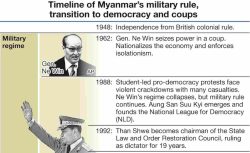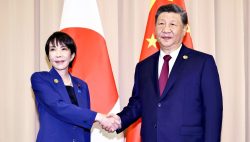16:04 JST, November 19, 2024
The will of the people as expressed in elections, which are the basis of democracy, must be respected.
However, in the process of forming the public will, if information of unknown authenticity spreads on social media and elections that should be fair are distorted, it is a serious situation.
Former Hyogo Gov. Motohiko Saito, who lost his post in response to a unanimous vote on a no-confidence motion against him by the prefectural assembly, was returned to power in a fresh election.
The no-confidence motion was triggered by whistleblowing by a former senior prefectural official about allegations of workplace bullying by Saito. Saito did not treat the accusation as public-interest whistleblowing, but instead ordered other senior officials to investigate the case and identified the former senior official and took disciplinary action against him. He died in July. He is believed to have committed suicide.
It is suspected that Saito’s and the prefectural government’s handling of the matter at the time was contrary to the purpose of the Whistleblower Protection Law.
Several factors are cited as reasons for Saito’s victory in the gubernatorial election. For example, his achievements, including free education at prefectural universities, were acknowledged. However, it can be said that the main driving force behind his victory was the information disseminated on social media by his supporters.
Immediately after he lost the post of prefectural governor, many believed that Saito would trail behind the other candidates and that it would be difficult for him to be reelected. But after the election campaign started officially, posts on social media began to increase, saying, for example, “Mr. Saito is not to blame.”
The posts, which were apparently intended to defame the deceased whistleblower to defend Saito, were disseminated one after another, and a tone of public opinion that supported Saito was created.
That kind of information was also disseminated by Takashi Tachibana, head of the political group NHK Party, who ran in the election while publicly stating that he would get Saito elected, not himself. That also seems to have created ardent supporters for Saito.
As a result, the essential debate over the whistleblowing was obscured and voices in support of Saito became a major wave.
Similarly, in the Tokyo gubernatorial election in July and the recent House of Representatives election, certain candidates and political parties made great strides beyond expectations by making full use of social media.
Information on social media is, in not a few cases, not only a mixture of falsehood and fact, but also there are more than a few irresponsible posts that seem as if they were aimed at generating advertising revenues.
If the will of the people is formed due to the influence of posts that appear to be aimed at defaming opposing candidates, it will be impossible to maintain fairness and impartiality in elections, which will invite a crisis of democracy. Political parties should deepen discussions on how social media and elections should be.
The fact that Saito has gained the trust of the people of the prefecture does not mean that the allegations against him have disappeared. The prefectural assembly’s special investigative committee and the prefectural government’s third-party panel are continuing their investigations into the whistleblowing. If they conclude that there was a problem with Saito’s handling of the situation, who will take responsibility, and how?
(From The Yomiuri Shimbun, Nov. 19, 2024)
Top Articles in Editorial & Columns
-

Myanmar Will Continue Under Military Rule Even After Election, Ex-Ambassador Maruyama Says in Exclusive Interview
-

40 Million Foreign Visitors to Japan: Urgent Measures Should Be Implemented to Tackle Overtourism
-

Expansion of New NISA: Devise Ways to Build up Household Assets
-

China Criticizes Sanae Takaichi, but China Itself Is to Blame for Worsening Relations with Japan
-

Withdrawal from International Organizations: U.S. Makes High-handed Move that Undermines Multilateral Cooperation
JN ACCESS RANKING
-

Univ. in Japan, Tokyo-Based Startup to Develop Satellite for Disaster Prevention Measures, Bears
-

JAL, ANA Cancel Flights During 3-day Holiday Weekend due to Blizzard
-

China Confirmed to Be Operating Drilling Vessel Near Japan-China Median Line
-

China Eyes Rare Earth Foothold in Malaysia to Maintain Dominance, Counter Japan, U.S.
-

Japan Institute to Use Domestic Commercial Optical Lattice Clock to Set Japan Standard Time




















